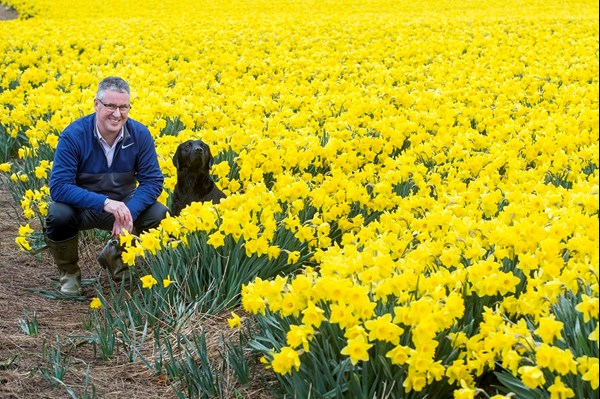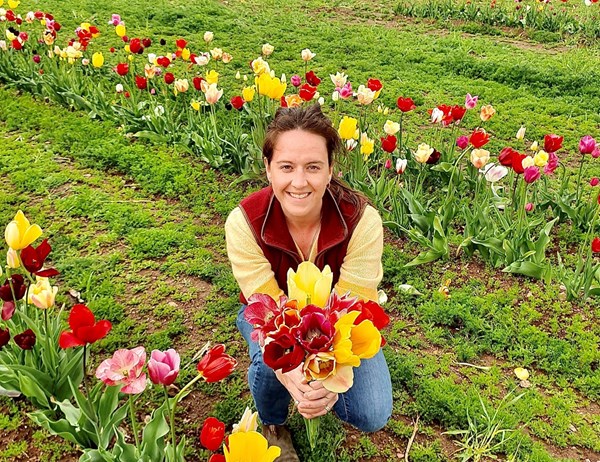Flower Power: Scottish Growers Unite To Promote 'Grown Not Flown'
The Scottish climate is conducive to growing flowers, yet we import 90 per cent of what we buy. Scottish flowers could be a resilient supply chain post Covid and Brexit - there is potential for local supply and demand. The RISS group worked with the Scottish horticulture sector and rural affairs minister Mairi Gougeon to promote 'grown not flown' which is climate-friendly and could be useful for farm diversification.
In this article, Scottish growers Mark Clark, Arianne Knowles and Kym McWilliam share their experience from the project.

Mark Clark and Baxter
Mark Clark - Grampian Growers
“Unless you’re driving up the A90 in April or May and notice the yellow fields, most people in Scotland are not aware that we grow daffodils,” says Mark Clark of farmer co-op Grampian Growers. Yet Grampian Growers unites 12 farms, with 1200 acres of daffodils between them, in Perthshire, Angus and South Aberdeenshire.
Clark is working with eight other growers from elsewhere in Scotland in a Soil Association Scotland-led Rural Innovation Support Service (RISS) group, facilitated by Amanda Brown and Helen Glass of Scotland’s Agricultural Organisation Society (SAOS). Through Clark the RISS members are linked to a horticulture industry group set up to increase knowledge of the sector amongst policy makers, working with Rural Affairs minister Mairi Gougeon.
“With Covid and with Brexit it’s all about the short supply chains and bringing people together,” says Clark. “Along with others in the RISS group I am passionate about flowers and bulbs, but as an industry it’s very much unknown – there is no association, no representative body.
“There is little data on the cut flower sector in Scotland, but the big florists say there’s not enough local supply for weddings and events, even during Covid, and they’re desperate to source locally. That supply chain doesn’t really exist yet.”
Microgrower and RISS group member Arianne Knowles, who runs Flourish Ayrshire from her 14-acre smallholding Roadinghead, near Cumnock, agrees. “Through selling at a local farm shop I’ve met a local florist who wants to reduce flower miles and loves the idea of sourcing close by,” she says.
“There’s a tale of old that somehow British flowers are wildflowers that wither quickly, but actually they have an excellent vase life. The imported ones you buy only last because they’re treated with a load of chemicals.”
“The climate in Scotland is actually conducive to growing flowers,” says Clark. “We have high quality soil, with fewer pests and less disease. Pests love warm and wet and we’re certainly not warm! So we need a third of the fungicide they might need in Cornwall, for example.”

Kym McWilliam with her tulips
Kym McWilliam, NJ McWilliam and Co
RISS group member Kym McWilliam, of 500- hectare arable farm NJ McWilliam and Co at Laurencekirk, Aberdeenshire, was unable to sell her daffodil crop to Scottish supermarkets in 2020, because the late Easter meant their cold stores were already full of cheaper, English flowers. “It’s a thorn in my side,” she says, “because fresh flowers are 100 times better. Once they’ve been in a cold store for a month their vase life is much shorter and they look hellish, actually.”
She joined the RISS group because she wanted a voice for commercial growers in Scotland. “People don’t believe me when I say I’m one of ten large-scale flower growers in Scotland – they don’t think flowers are grown in Scotland, but I think the UK flower industry still has lot to give.”
She is experimenting with commercial peony growing, which is going well so far, and has given over a field for ‘Pick your Own’, which allows her to experiment further with varieties. “We always admired my grandmother’s peonies growing outside the kitchen window and then I thought, if they can grow in the garden, why not the field? We have beautiful dahlias still in the field now in November here in Aberdeenshire, but we’re importing roses from South Africa.
“Our flowers are grown not flown. You have to think about the carbon footprint. If we can chip away at the imported figure, so that even a quarter of flowers are grown in the UK, that would be something big. Brexit and Covid means we don’t know what the future holds. Our sector is dependent on labour, for instance, and it’s really important we work together.”
It’s also about economies of scale, says Clark. “It’s expensive for small producers to transport to wholesale or retail,” he says, “it requires temperature control, but if we do it through a transport hub we reduce costs. Same with labour.”
“There’s a story to be told about our produce that links up with the story about food and drink in Scotland,” says Arianne Knowles. “Through the RISS group I’ve met a sheep farmer who’s wanting to diversify into flowers, for example. It fits in with what we should be doing – localising, and becoming more sustainable.”